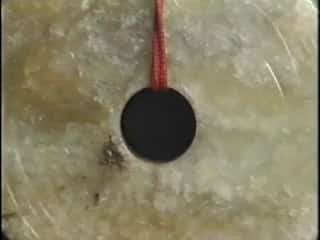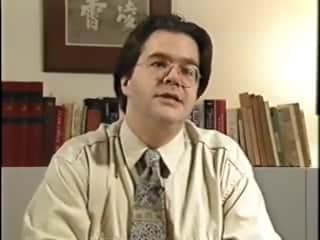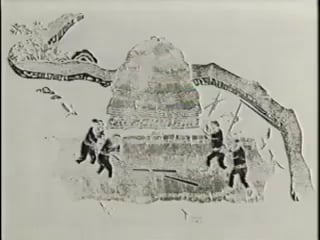Playlist: The Book of Songs and China’s Literary Tradition
Poetry as the Preeminent Literary Form: “Quince”
The Western Zhou dynasty (1050-771 BCE) ruled over several principalities, which fragmented in the eighth century BCE into a number of feudal states. The Zhou dynasty moved its capital east and ruled over the state of Zhou, in the midst of the other states and had only nominal rule over the others. The era of Eastern Zhou dynastic rule is divided into the Spring and Autumn Period (722-481 BCE) — so called because of the annual records compiled in the spring and autumn during these years, and the Warring States era (403-221 BCE). The year 256 BCE marks the end of the Eastern Zhou dynastic rule.
Transcript
"Quince," from the Book of SongsShe tossed a quince to me —
I repaid with a precious girdle-gem.
But this was no repayment,
It just shows that I'll love her forever.
She tossed a peach to me —
I repaid with a precious greenstone;
But this was no repayment,
It just shows that I'll love her forever.
She tossed a plum to me —
I repaid with a precious stone of ebon;
But this was no repayment,
It just shows that I'll love her forever.
Robert Oxnam: Poetry, in the Chinese tradition, was the preeminent literary form, understood as central to the expression of human emotions. The earliest works of Chinese literature are lyric poems composed between the years 1000 and 600 before the Common Era, during the first flourishing of the Zhou dynasty.
Three hundred and five of these poems were compiled sometime after the year 600 BCE into a collection known variously as the Book of Songs, the Book of Poetry, or the Classic of Poetry. *
* The Book of Songs is also known as the Book of Poetry, the Classic of Poetry, and sometimes the Book of Odes. These are all possible translations of the Chinese title, Shi jing [Shih-ching in Wade-Giles romanization].
Early Literature in China and Greece Compared
Transcript
Robert Oxnam: People in China were composing the poems in the Book of Songs at approximately the same time Homer was writing his epics, the Iliad and the Odyssey, in eighth-century Greece. While the roots of the Western literary tradition lie in epic and drama, those of the Chinese literary tradition lie in lyric poetry.
Stephen Owen: Certainly, the fact that Chinese poetry begins in lyric is of complete importance. This is the highest, you know, in the West, of course, you know the notion of minor poetry originally means short poetry. So the lyric has always been the stepchild of the great genres of epic and drama; whereas in China, it is clearly lyric poetry or relatively short ballads become the norm. That's the real heart of the tradition. And when people look back to what could they do, what important thing could they do, like what was done in the past, it was not writing an epic or play, but it was being able to write lyric poetry.
Robert Oxnam: The ancient Chinese collection, the Book of Songs, served the early Chinese in much the same way as the Greek epics served the ancient Greeks.
Stephen Owen: The Homeric epics were sort of the bonds that held together these Greek city-states, which were usually fighting among one another, had very different customs, but Homer was considered their cultural past. It was the way you created unity out of the people.
And the Classic of Poetry*, which comes together around 600 BCE and circulates among the feudal lords, becomes the way the scattered Zhou states, these feudal states, are able to think about their past. But, unlike Homer, which is really one voice, one class, you know sort of the male warrior, the nice thing about the Classic of Poetry is that it is all these voices thrown together that represent Zhou society — the ritual poems, the war poems, women, the courts of the various princes, the common people — all of it sort of comes together to create this sort of complex vision of Zhou society.
* The Book of Songs is also known as the Book of Poetry, the Classic of Poetry, and sometimes the Book of Odes. These are all possible translations of the Chinese title, Shi jing [Shih-ching in Wade-Giles romanization].
Simplicity of Poetry in the Book of Songs: “Roll up Your Skirts”
Transcript
Paul Rouzer: And when we look at these particular poems now, they seem for the most part to be folk songs or poems produced by ordinary people, peasants, artisans, hunters, fisherman, and so forth. And they're very, very simple, very easy to understand. A lot of them bear a lot of similarities to folk poetry in all sorts of cultures.
The poems in the Book of Songs* are written for the most part in simple stanzas. Each stanza will express the main idea of the poem, and then subsequent stanzas will change one word or two. But the main idea of the poem remains the same in each stanza.
Many of them involve courtship rituals or marriage rituals, quite often women flirting with men or men flirting with women. A good example of that is one poem, very popular poem, in which a woman tries to lure a hesitant lover across the river to meet her for a tryst.
"Roll up Your Skirts," from the Book of SongsIf you really care for me,
then roll up your skirts and cross the Jung.
If you don't care for me,
aren't there other ones who will,
you craziest of crazy boys?
Paul Rouzer: This is a good example of the simplicity of these particular poems. A type of simplicity that appeals very much to the modern reader and has made the Book of Songs* very, very popular in present times.
*The Book of Songs is also known as the Book of Poetry, the Classic of Poetry, and sometimes the Book of Odes. These are all possible translations of the Chinese title, Shi jing [Shih-ching in Wade-Giles romanization].
Collecting Songs and Polling the People: “Big Rat, Big Rat”
Transcript
Robert Oxnam: Many of the poems in the Book of Songs* are about courtship and marriage; others reflect the daily concerns of ordinary people.
Marcia Wagner: Tradition has it, at least the legend goes, that in China it was very important for the emperors, the rulers, to know how the common people were feeling. And so they would send people out from the court into the countryside to hear what the people were singing.
And the tradition is that the collection of these popular songs was a kind of a Gallop poll being taken of how people were feeling, how they were feeling both about their own lives and about the government.
Conscripted soldiers are singing about how miserable they are being on forced march or how much they dislike being sent to war and how much they long for home and how poor the conditions are when they're sent out to frontier battle duty.
Some of them are complaints against tax collectors. There's one about "Big Rat, big rat, why are you taking so much of our millet?"
"Big Rat, Big Rat," from the Book of SongsBig rat, big rat,
Do not gobble our millet!
Three years we have slaved for you,
Yet you take no notice of us.
At last we are going to leave you
And go to that happy land;
Happy land, happy land,
Where we shall have our place.
Big rat, big rat,
Do not gobble our corn!
Three years we have slaved for you,
Yet you give us no credit.
At last we are going to leave you
And go to that happy kingdom ...
* The Book of Songs is also known as the Book of Poetry, the Classic of Poetry, and sometimes the Book of Odes. These are all possible translations of the Chinese title, Shi jing [Shih-ching in Wade-Giles romanization].
Allusion to Nature
Transcript
Robert Oxnam: Throughout the Book of Songs*, there are references to nature, and allusion to nature becomes a major motif in later Chinese poetry.
Marcia Wagner: One of the most common techniques in the Book of Poems or the Book of Songs* is to juxtapose a couple of lines describing a human situation with a couple of lines describing something that happens in nature. So a young bride who is, we hope, going to soon bear children is compared to a young peach tree that first has beautiful blossoms and then bears fruit.
Stephen Owen: Sometimes it seems like there's an opposition, where it will be stormy outside and the person will be content within. But I think the important thing here is again putting an image of the natural world side by side with an image of the human world, and forcing the reader to draw some sort of connection, to think about the two as in some way being in parallel or related to one another.
Marcia Wagner: This is the essence of the lyric tradition throughout the next two and a half millennia in China, where natural imagery, metaphors of natural phenomena, are frequently used to illustrate human emotion or a human situation.
* The Book of Songs is also known as the Book of Poetry, the Classic of Poetry, and sometimes the Book of Odes. These are all possible translations of the Chinese title, Shi jing [Shih-ching in Wade-Giles romanization].
About the Speakers
Robert B. Oxnam
President Emeritus, Asia Society
Stephen Owen
James Bryant Conant University Professor; Professor of Comparative Literature, Harvard University
Paul Rouzer
Associate Professor, Department of Asian Languages and Literatures, University of Minnesota
Marsha Wagner
Adjunct Professor of Chinese Literature, Columbia University
David D. W. Wang
Edward C. Henderson Professor of Chinese Literature, Harvard University
Related Videos
The Book of Songs and China’s Literary Tradition
The Book of Songs: Legends of the Zhou and the Nature of Chinese Society
The Book of Songs: The Han Dynasty Codification
Individual Voices in the Book of Songs










